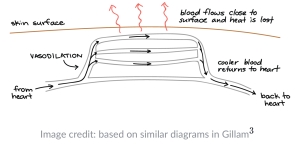Chiropractor Jacqui Rix and PhD supervisory team (which includes me!) have just had published ‘Stakeholder involvement in the development of trial material for a clinical trial‘. It highlights the importance of not just patient-public involvement in research but of involving practitioners too to increase the chances of the study being successful. Read it here! (Free open access). This is part of Jacqui’s project entitled ‘Biomechanical Effects of Manual Therapy – A Feasibility Study’. For more on that watch this space!
For student nurses, especially in V2 – peripheral “shutdown”
What’s in a word? Well, a lot.
Struggling with understanding peripheral ‘shutdown”? Would peripheral “vasoconstriction” make all the difference?! Here’s what’s happening with shutdown or vasoconstriction (and vasodilation). Check out the amazing Khan Academy if you want to know more.Check out the amazing Khan Academy if you want to know more.
New RCT on manual therapy for chronic migraine – study protocol published
Manual therapy for chronic migraine: a pragmatic randomised controlled trial study protocol by Odell, J, Clark, C, Hunnisett, A, Ahmed, O, Branney J (2019)
I’m delighted to promote the first publication from chiropractor Jim Odell‘s PhD which I’m supervising alongside Dr Carol Clark and Dr Osman Ahmed. This is a pragmatic trial exploring the effectiveness of adding manual therapy to usual care (management by neurologist). The study protocol has just been published, and you can read it here.
New study investigating biological and psychosocial predictors in neck and whiplash-associated disorders
An investigation of biological and psychosocial prognostic predictors in neck pain and whiplash associated disorders
I was proud to be invited to present at the Royal College of Chiropractors (RCC) AGM & Winter Conference, January 2019, on my RCC Early Career Postdoctoral Fellowship funded research. This is a part-time project over three years entitled, ‘An investigation of biological and psychosocial prognostic predictors in neck pain and whiplash associated disorders’.
This study will investigate the role of cervical inter-vertebral motion sharing and disc generation in neck pain; determine any change in motion sharing in patients with neck pain who underwent spinal manipulative therapy (and relationship with patient-reported outcomes); determine the psychosocial variables routinely collected in chiropractic practice that are prognostic for neck pain and whiplash-associated disorders; and determine additional psychosocial variables that ought to be routinely collected. If you’d like to find out more about this exciting study, please go here to watch a recording of my 12 minute presentation. Thank you to my collaborators on this research: Professor Alan Breen and Dr Alex Breen of the Centre for Biomechanics Research, AECC University College, and Dr Jonathan Field, Back2Health.
Curious as to how spinal manipulation works? Help us find out by applying to do this exciting PhD!
PhD Studentship – Biomechanical Effects of Spinal Manipulation – a Feasibility Study
I’m delighted to be part of the supervisory team on this exciting new PhD project collaboration between Bournemouth University and AECC University College aimed at improving our understanding of the mechanism of spinal manipulation in the treatment of back pain. For more information please follow this link.
Apply today!
Essential knowledge for nurses: Evidence-based non-drug options for pain relief post knee replacement
Drug-Free Interventions to Reduce Pain or Opioid Consumption After Total Knee Arthroplasty: A Systematic Review and Meta-analysis
by Dario Tedesco, MD1,2; Davide Gori, MD2; Karishma R. Desai, PhD1; et al
It’s important for nurses to keep up to date with evidence-based interventions to help their patients with pain management. Many patients continue to experience high levels of pain post-op, so any new options nurses can incorporate into their pain management strategies have the potential to make an important impact on patient suffering.
In this review the authors sought to answer the following question: Which of the nonpharmacological interventions used for postoperative pain after total knee arthroplasty are effective?
If you want to know the ‘answer’, click here!
Absence of evidence is not evidence of absence
An invisible unicorn has been grazing in my office for a month…Prove me wrong.
by Martin Burton, Evidently Cochrane
An excellent blog on interpreting the findings from research evidence – the importance of effect size and an sufficiently large sample size from which to draw meaningful conclusions. In fact, caution is urged in drawing any firm conclusions from any one study. But what if there were a million people in each arm of a randomised clinical trial? Surely that is enough to be able to be sure that a treatment actually works or does not? The answer to that might surprise you…
What should we be eating, and advising patients to eat?
What should we be eating? by Dr Andrew Weil
Andrew Weil does a fantastic job of summarising what we should be eating and why in this presentation at the College of Medicine entitled, ‘What should we be eating?’.
There won’t be any surprises here for those of you who have been staying up to date with advances in nutrition science (basically, the Mediterranean diet is good for you) but Dr Weil’s delivery is well thought out, succinct and persuasive – so whether this is new to you or revision, a very worthwhile 40 minutes. The next question after ‘What should we be eating?’ is, ‘How do we get patients to eat more healthily?’ Well, we know that’s a tough nut to crack, but what better place to start than to be persuaded that our growing understanding of what it means to eat healthily also embraces getting pleasure from food. Cheers to that!
Role for nutrition in enhanced recovery for hip/knee replacement? RCN Society of Orthopaedic and Trauma Nursing International Conference
A review of the literature related to the role of nutritional supplementation for an enhanced recovery pathway for hip and knee replacement
by Branney, J*., Wainwright T.W.**, Dyall S.*, Middleton R.G.*
*Faculty of Health and Social Sciences, Bournemouth University
**Orthopaedic Research Institute, Bournemouth University, Bournemouth, UK
Delighted to present this work at the Royal College of Nursing (RCN) Society of Orthopaedic and Trauma Nursing International Conference and Exhibition, 8-9 September 2016, Cardiff, Wales. Headline? At present, the evidence base does not support the use of nutritional supplementation in enhanced recovery after surgery pathways for hip/knee replacement. To find out more (full size poster), click here.
I’d be delighted to hear from anyone involved with any enhanced recovery after surgery (ERAS) pathway, particularly in orthopaedics, who has views on this, particularly those who have any practice and/or research experience related to the role of nutrition in ERAS pathways.





